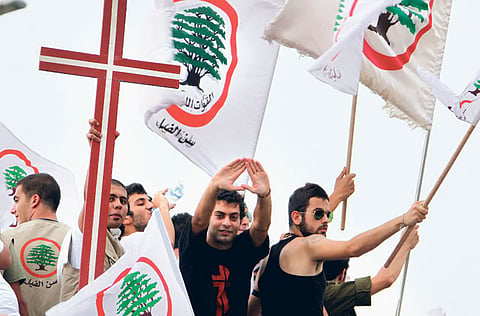Christians face uncertain future in Lebanon
Hit by low birthrate and emigration

Beirut : After a panicky mass flight from his Christian village, Sami Abi Daher watched from across the valley as Syrian-backed Druze fighters burned and looted it.
That was back in 1983 when battles forced tens of thousands of Christians from their homes in the Aley and Shouf hills near Beirut in a bloody postscript to Israel's 1982 invasion.
Abi Daher, a former Christian militiaman, has never returned to live in his village, Rishmaya, instead working and bringing up his three children in a Christian district of Beirut.
Sectarian hatreds certainly fuelled Lebanon's civil war, but any threat to Christians was rooted more in the country's tangled politics than in religion, according to Abi Daher.
Now a jovial 54-year-old hairdresser, he still harbours grievances — against the Christian leaders he blames for the disaster that reconciliation efforts have yet to erase in full.
"I'll tell you something. If you don't hurt the Druze, they won't hurt you," he says, accusing former Christian warlords and politicians of responsibility for the rout in the mountains.
Weak and divided
Twenty years after the 1975-90 civil war, Christians formally enjoy a reduced but still disproportionate weight in Lebanon's sectarian power-sharing system. While under no specific threat, as a community they are weak and divided.
"There isn't anywhere else in the Middle East that has a Christian president," says Abi Daher. "Just as well. If the Muslims had ruled, imagine what would have become of us."
Yet he denies that Muslims pose any peril for Christians.
"There's no problem between us and the Sunnis and Shiites... The problem is with the politicians of course."
Christians number perhaps a third of Lebanon's five million people, but they are guaranteed half the seats in parliament, as well as the posts of president and army commander.
Nevertheless, the Taef accord that ended the civil war shifted more power to the prime minister, always a Sunni, and the parliament speaker, a post reserved for Shiites.
Christian influence was also constrained during 15 years of postwar Syrian control of Lebanon, when one anti-Syrian leader, Samir Geagea, was in jail and another, Michel Aoun, was in exile. In effect, Damascus chose the Christians — and indeed the Muslims — who filled seats in parliament and government.
Even now, electoral law vagaries mean that many Christian lawmakers depend on Muslim votes to get elected. Mired in the rivalries of their own politicians, Christians are disunited. Some back the powerful Shiite Hezbollah group. Others support Prime Minister Sa'ad Hariri's Sunni bloc.
The notion of solidarity among Christians in Lebanon, let alone with their co-religionists in the region, strikes Abi Daher as a joke. "We're in a million pieces," he laughs.
Pluralistic nature
All of Lebanon's mainstream Muslim groups acknowledge its pluralistic nature. Even Hezbollah, a militant pro-Iranian Islamist movement, preaches coexistence with Christians, and does not try to impose Iran-style Islamic strictures.
Christian politicians and clerics voice fears that declining birthrates and emigration are eroding their community's presence in Lebanon, although researchers say Shiites and Sunnis migrate at similar rates.
Abi Daher managed to accumulate five passports, but opted in the end to stay in Lebanon. His two brothers have worked in Saudi Arabia and his son in Kuwait. They have all returned home.



